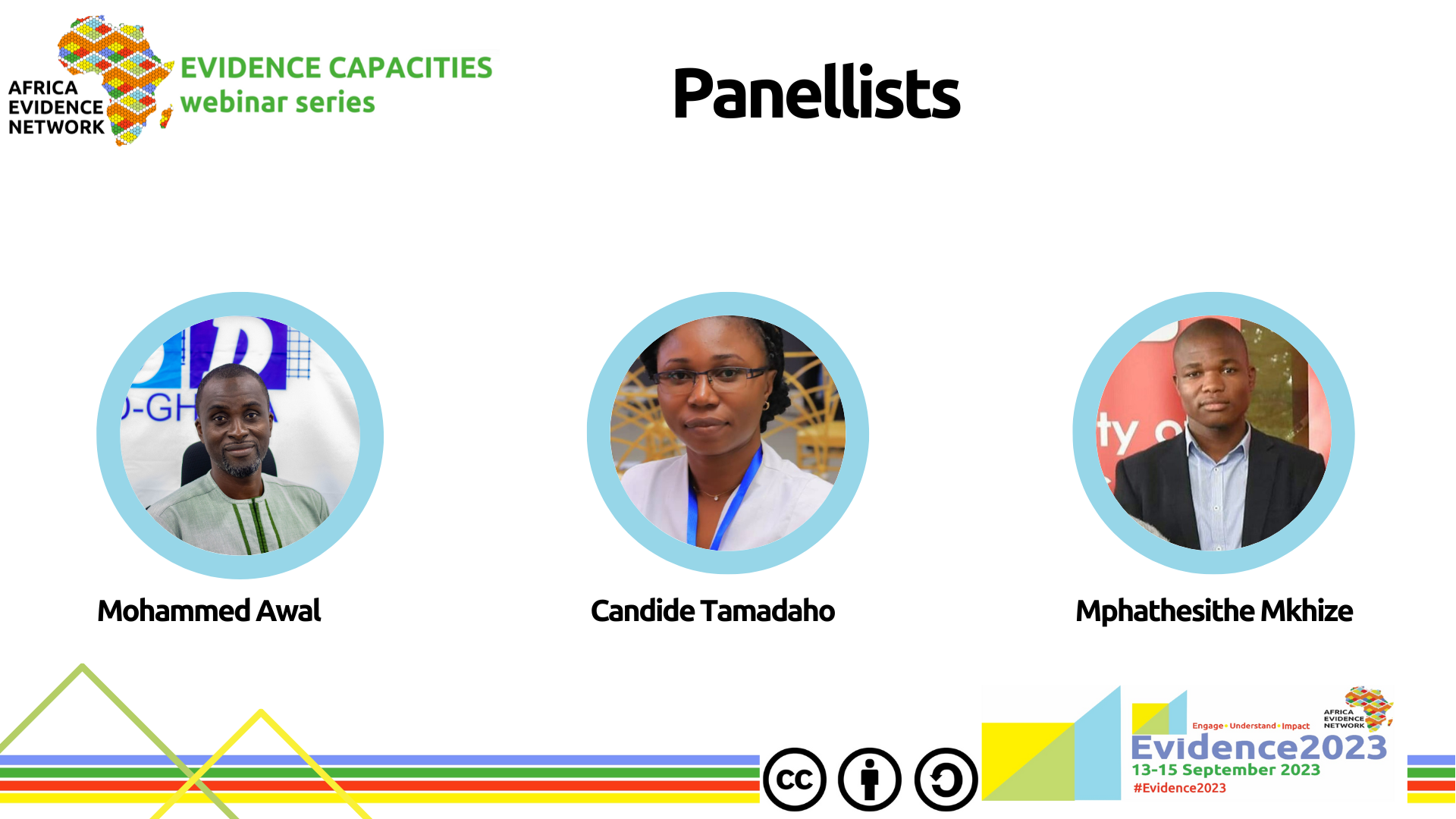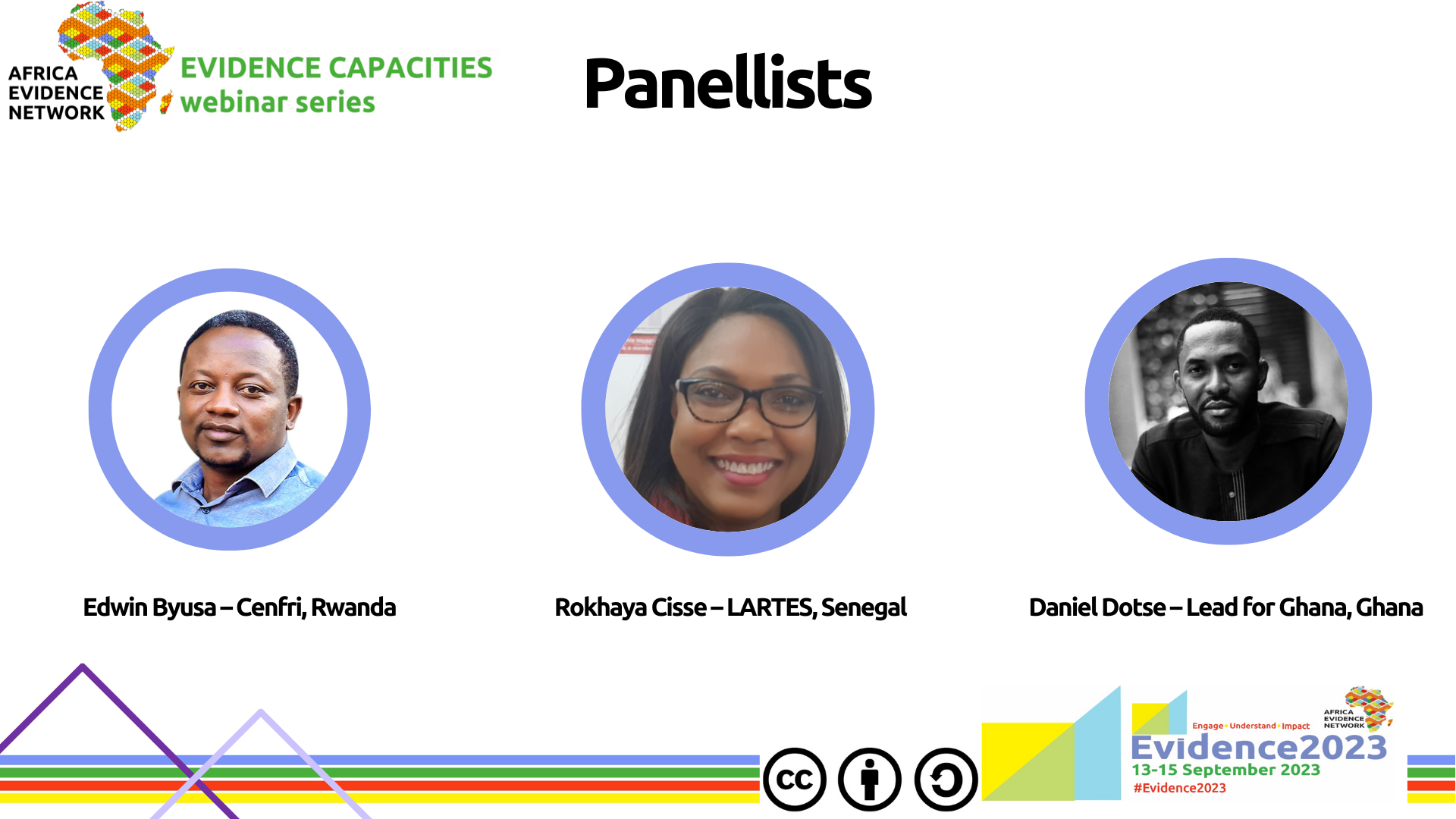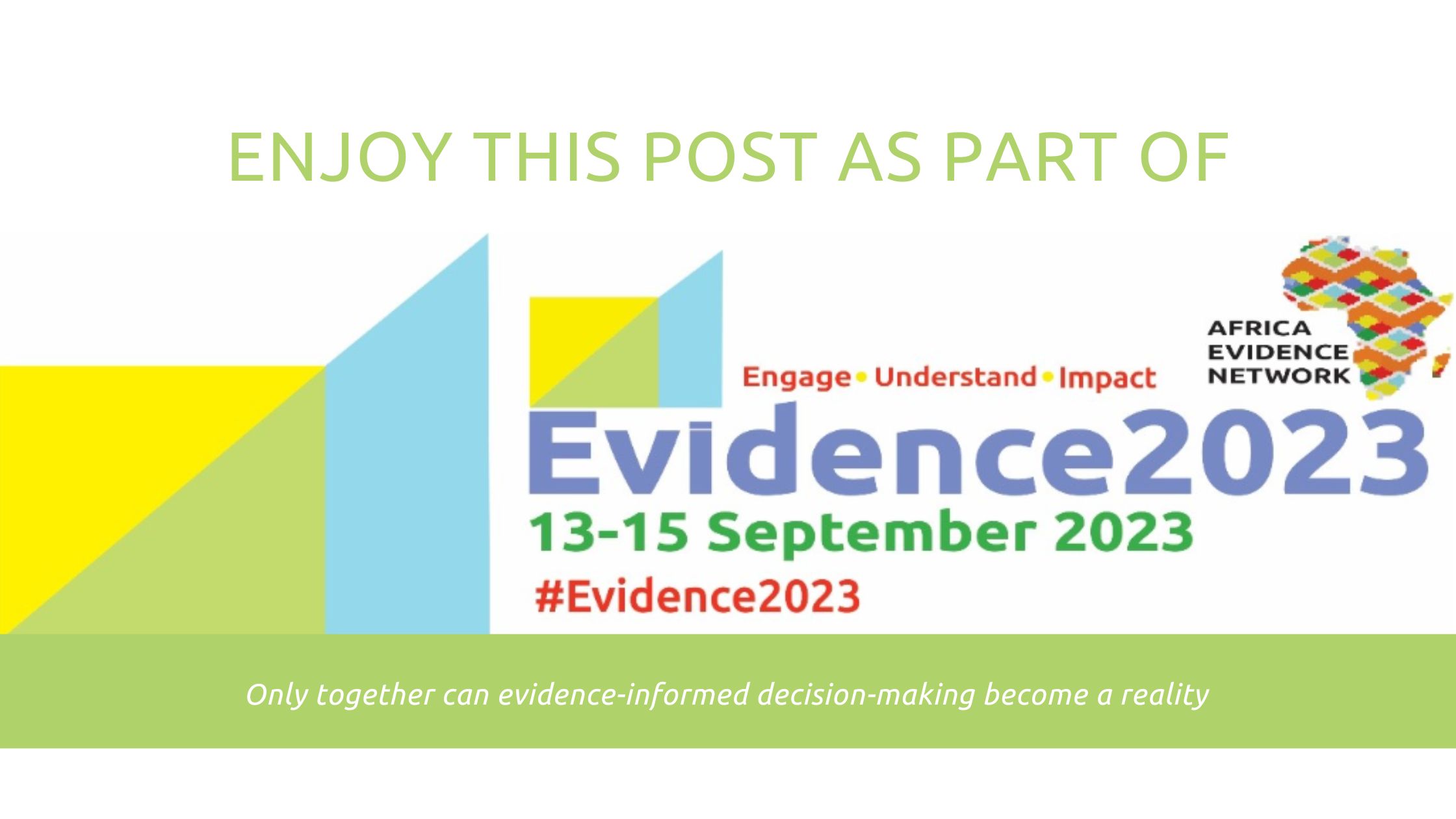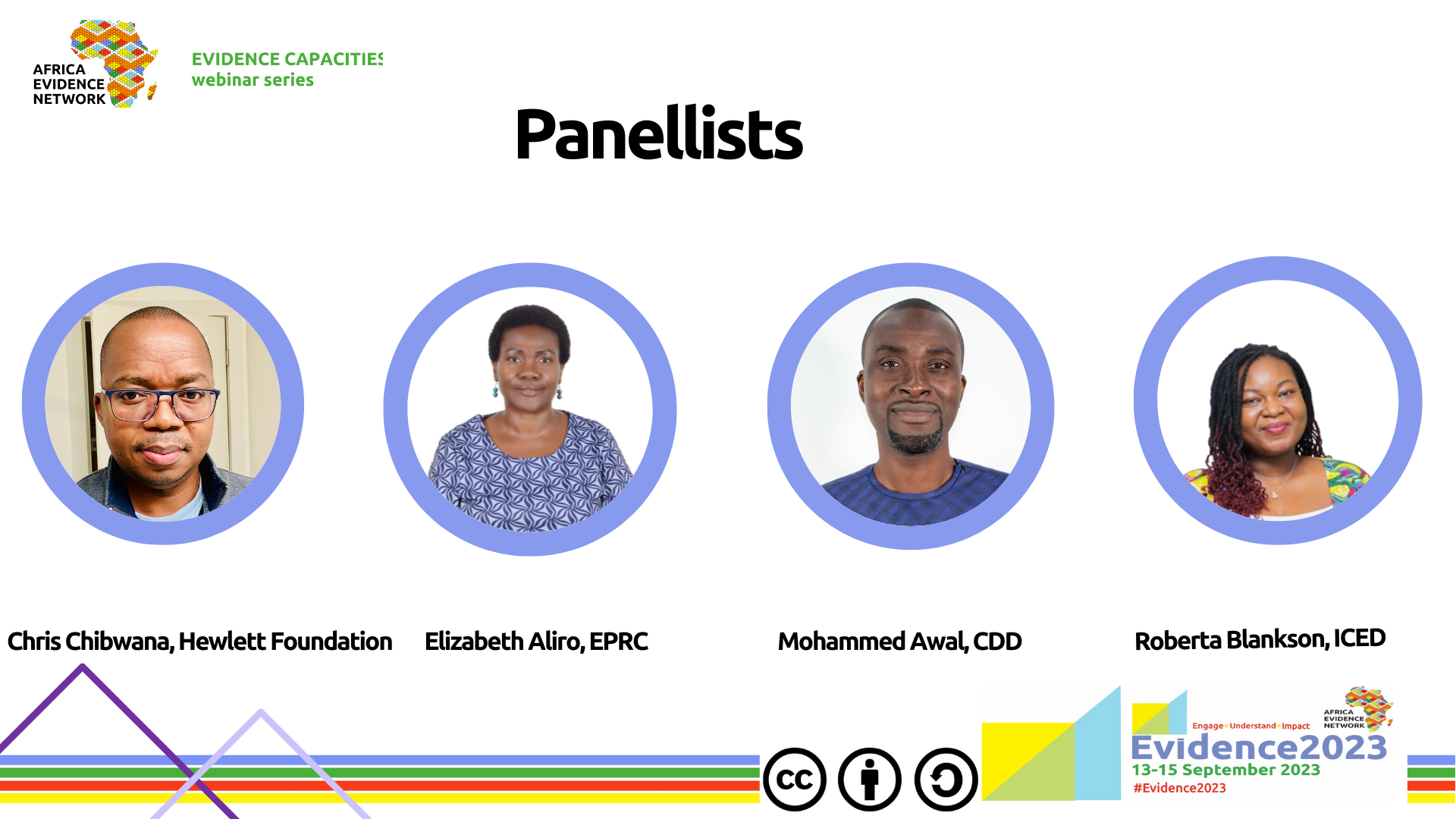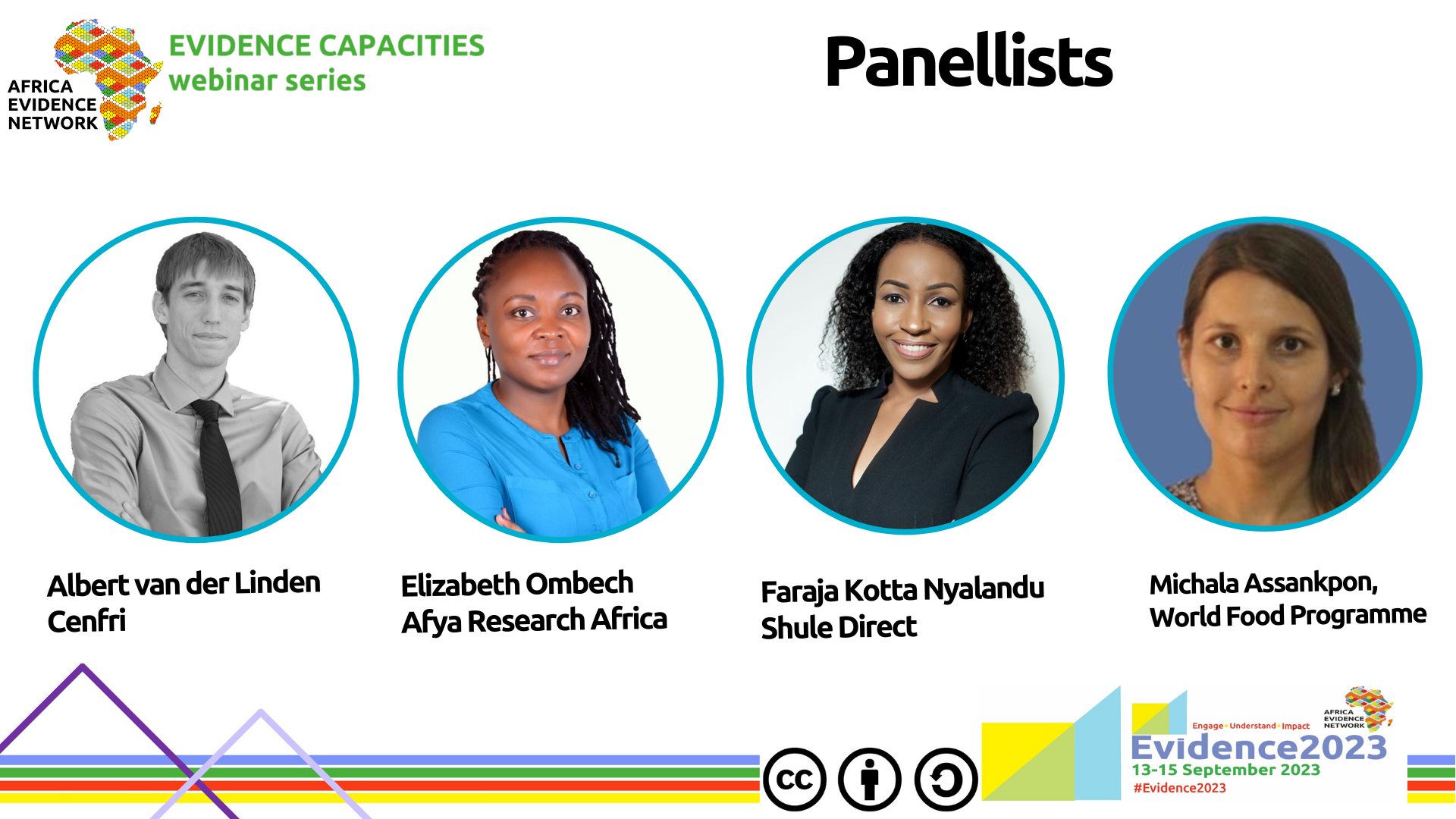
If you are interested in this topic, review the webinar presentation or watch the recorded webinar.
This blog post is based on the third webinar of the Evidence 2023 capacities webinar series hosted by the Africa Evidence Network (AEN). The AEN Evidence 2023 capacities webinar series aims to create a platform for sharing experiences and ideas that push our thinking on how (approaches) we enhance capacity for evidence use in Africa. The series also strives to generate ideas on addressing structural and value issues for wider ecosystem strengthening efforts. It is also our hope that these discussions will be the basis for improving and illustrating the AEN's Manifesto on capacity development for evidence use in Africa.
The first Enhancing Evidence Capacities webinar started with an exploration of innovative approaches for evidence-informed decision-making (EIDM) capacity development in Africa. The next one unpacked implications of these innovations among various stakeholders within the evidence ecosystem. This last webinar took on innovative approaches being deployed to address structural and value issues within evidence ecosystems in Africa, and this associated blog post presents a summary of discussions. The webinar series is being held by the Enhancing Evidence Capacities Working Group as a build-up to the much-anticipated Evidence 2023 in September 2023.
Empanelled actors
Typically, the event was opened and closed by the session chairperson, Siziwe Ngcwabe, who doubled as co-chair for Evidence 2023. She gave a background to the Manifesto for EIDM capacity development, being a declaration by all from Africa’s evidence ecosystem about the kind of capacity development we practice, challenging mainstream views on capacity-building for EIDM in Africa.
Kirchuffs Atengble from PACKS Africa moderated a lively interactive session among seasoned panellists that had Albert Van Der Linden (Cenfri, Rwanda), Elizabeth Ombech (Afya Research Africa, Kenya), Faraja Kotta Nyalandu (Shule Direct, Tanzania) and Michala Assankpon (World Food Programme).
Addressing structural and value issues within evidence ecosystems in Africa
Each panellist began their submissions by giving a bit of background of their roles within their organisations, as well as innovative approaches being implemented to enhance EIDM capacities. Albert’s work involves supporting his organisation to assist and enable the government of Rwanda and the private sector players to use data to make decisions, deploying traditional but also training courses on various levels of data science. To him, collaborating with staff members of beneficiary institutions is the most effective way to build their capacity, as well as create the demand for evidence within institutions and within systems.
At Afya Research Africa, Elizabeth led among others their work with Joanna Briggs Institute (JBI) to build the capacity of communities of healthcare workers within Kenya and also across the East African region. This partnership helped build capacity at a subsidised cost and enabled the healthcare workers to spread the importance of using evidence in healthcare practice.
With over 10 years of working experience in sub-Saharan Africa, Michala emphasised the existence of different indexes that measure different things such as the Human Development Index (HDI) that manage to position critical governance issues high on the agenda of governments and other actors, and quizzed whether something similar should not be created in relation to evaluation. This idea led to the creation of the National Evaluation Index, which facilitates an overview of progress within the system over time, serving also as a platform for peer-to-peer exchange and learning.
Faraja indicated that their work in the area of digital education has helped digitise the national curriculum for primary and secondary schools in Tanzania, amongst many other digital analytics. At individual levels, they found that both physical and digital worlds complement each other.
Aiming for longer-term impacts and sustained use of capacities developed
At the World Food Programme, the longer-term impact is about promoting participation and local ownership through the National Evaluation Capacity Index. “We believe if the index is owned by the participating governments and by the national actors it will be sustained.” This has been a collaborative effort and all participating countries have been involved in the initiative over the past 3 years to develop the index; with Columbia for instance embedding this solution into their national strategy, and the index becoming a regular part of their National Evaluation System.
Albert highlighted the value of longer-term sustainability at Cenfri, through 3 different mechanisms. First, they work with decision-makers at the strategic level, who have a strong performance-driven culture in Rwanda. On the technical side, they implement solutions by collaborating closely with the staff of beneficiary organisations. Finally, they established a community of practice within Rwanda on data science to continuously discuss and improve their learnings.
At Shule Direct, they integrated their web platform with the school information system, which has gained a lot of traction in terms of the use of the data to inform practices within schools and at the regional education offices. A major plan envisaged is to mobilise the education network, teachers’ union, and teacher service commission to facilitate capacity building for teachers in Tanzania, which will extend focus for EIDM in any school system to all data generation personnel within establishments.
Elizabeth of Afya Research Africa indicated that their sustainability measure and appreciation of evidence practices are anchored in partnership with the International Academic Institution. They also ensure evidence generation by supporting trainees to do systematic reviews of implementation reports within their areas of work in the healthcare space, in addition to certifying them. They have equally supported the government to address interoperability issues between private health practitioners and the public system to ensure comprehensive data generation. Co-creation is an approach used in their programmes, as well as running forums where discussions are moderated on evidence literacy. The forum offers professional space to integrate evidence into their general practice.
Questions and answers
The audience had an opportunity to ask questions which were responded to by the panellists. Albert responded to a question on ‘how they were spending quality time to ensure sustainable capacity enhancement at the individual level.’ To do this, they profiled senior members at the potential beneficiary entity, who are then short-listed and included in their training courses which are run once every quarter. Once graduated, the implementing team assigns a local staff or someone from the headquarters in South Africa to spend a month or two at the entity to develop and implement the solution. In that process, these senior members become part of the project team.
In response to a second question, he informed that beneficiary entities mostly have an incentive for the sustainability of their work, as that is discussed at project initiation. Project deadlines are critically discussed from the onset, as they largely depend on resources from both parties. A major strategy to stimulate demand is to ensure that the evidence which is generated through data analytics speaks directly to the KPIs of beneficiary organisations. And obviously, the more exposed they are to these pieces of relevant data, the more they need it.
In response to a question on strategies to scale innovations to other organisations and countries on the African continent, Faraja highlighted that their analytics are available online, although customised. She believes their analytics can be used in other contexts or web platform. “Our analytics are mapped within our educational content repository, and we have developed APIs that allow integration with other digital platforms which is a matter of plug and play.”
Michala responded to the same question, informing that the index is a multi-stakeholder initiative. In principle, the same initiative could be replicated through consultative engagement with governments and relevant actors in sub-Saharan Africa. It focuses on the National Evaluation system, so it is the government that holds ownership.
Elizabeth emphasised their use of partnerships, inviting partners within the region. They had an experience with an academic institution in Rwanda last year, and currently sourcing funding for their evidence implementation project across 3 countries in Africa.
Finally, on mechanisms being used to mainstream cross-cutting development themes such as equity, social inclusion, transparency, and accountability, Michala indicated that one of the dimensions of the national evaluation systems is the quality of the evaluation, which considers gender equality, women empowerment, and also human right issues.
On equity, Albert intimated that candidates received for their training programmes are sent by their partner institutions, which is monitored to ensure decent representation on the gender side. “What is also specifically important on equity is that we have good representation from the private sector as well as the public sector institutions.” Candidates must equally have to complete pre-requisite online courses to enter their training courses, as well as certain compulsory activities during the training week to qualify for training certification.
To Faraja, digital platforms are responsive in the sense that they can integrate and allow aspects of programmatic interventions, whether they are around equity, inclusion, gender lens, or human right-based approaches, to be factored in the design and deployment of the analytics. For Elizabeth, her organisation integrates these mechanisms through data collection and monitoring. “Since we are in the health space, we have disaggregated data by gender, social status, and disability.”
About the author: Maxwell Babilo Banu holds MSc. Monitoring and Evaluation from Christian Service University College.
He is currently the M&E Manager for TEERE for the past 8 years. He has developed a monitoring system for the organisation and tracking tools for effective monitoring of project activities for data uptake for decision-making. He has facilitated a lot of training activities for 17 Community Based Organisations (CBOs) across Upper East, Upper West, and Northern regions on the GIZ project “Enhancing Citizens’ Participation and Social Accountability at the District level”. He also facilitated a lot of training sessions in the establishment of the monitoring system for effective management of the Disability Fund across 13 Districts of the Upper East region. He is currently part of a community of practice promoting the institutionalisation of evidence use at the Bolgatanga East District Assembly if the Upper East Region, Ghana.
Acknowledgements: The author(s) is solely responsible for the content of this article, including all errors or omissions; acknowledgements do not imply endorsement of the content. The author is grateful to Charity Chisoro and Kirchuffs Atengble for their guidance in the preparation and finalisation of this article as well as their editorial support.
Disclaimer: The views expressed in published blog posts, as well as any errors or omissions, are the sole responsibility of the author/s and do not represent the views of the Africa Evidence Network, its secretariat, advisory or reference groups, or its funders; nor does it imply endorsement by the afore-mentioned parties.
Suggested citation: Banu M (2023) Innovating Capacity Development for EIDM in Africa Addressing Structural and Value Issues within ecosystems. Blog posting on 18 July 2023 that is part of the AEN blog series on the Evidence 2023 Capacities webinar series. Available at: https://www.africaevidencenetwork.org/en/learning-space/article/248/
